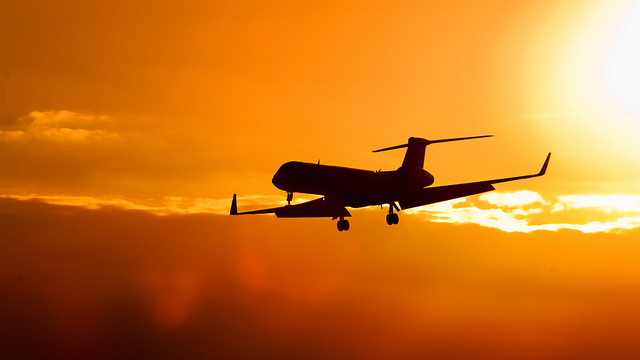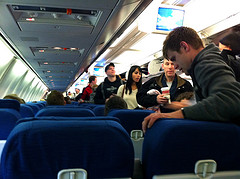
Airplane riding into the sunset. Source: Flickr Commons Kuster & Wildhaber Photography
If you were to walk into my room right now you would see cold medication, chicken noodle soup and a still unpacked suitcase from the trip I took over reading break. I rode an airplane twice in the past week and now I am getting a cold. Coincidence? I think not. And neither does science. According to a study done, a person’s chances of contracting a cold on an airplane are significantly higher than when on the ground (Hocking & Foster, 2004) .
There are several reasons of why people are more susceptible to colds and respiratory diseases after flying. Surprisingly, studies have proven that lack of air circulation is not to blame (Zitter, Mazonson, Miller, Hulley, & Balmes, 2002) . A common misconception is that the air on a plane is stagnant and not fresh, therefore letting airborne bacteria sit there longer. In reality, air in an airplane is cycled through very sophisticated filters 15 to 20 times an hour. (Lang et al., 2007) This is much higher than the number of times air is cycled in homes and offices, 5 and 12 respectively. (Lang et al., 2007)
So if stagnant air isn’t the culprit, what is? Dry air is the main culprit according to one source (Hocking & Foster, 2004) . When you’re flying, the relative humidity drops to levels around 10%. This drop in relative humidity is a very big difference from on the ground levels, where for example, in Vancouver on February 24, 2014 is 96%. These low levels of humidity due to highflying elevations cause people’s first line of defense to not function properly. Mucous in the nose cannot form and bacteria can therefore pass.
Other culprits include the ratio of people to space. Since person-to-person interactions are very high (think of climbing over someone to get up to go to the bathroom), there is an even higher number of possible infectants in the air. Although airplanes are cleaned regularly, high-traffic areas that may not necessarily be cleaned thoroughly are thought to be possible bacteria rich areas. These areas include overhead bins, armrests, aisle seats and the seat-tray.

Here people can be seen touching the aisle seats. Source: Flick Commons Matt Hurst
One last reason that could contribute to getting sick after travelling is stress. A lot of people find travelling stressful and higher levels of stress can affect your immune system’s ability to ward off sickness (Glaser & Kiecolt-Glaser, 2005) .
So what can you do to ward off a cold when travelling by airplane? This article has several great suggestions. The most important being staying hydrated and keeping your hands clean. Next time I travel by plane, I will definitely be taking better advantage of the free beverages offered inflight.
~Claire Curran
References
Glaser, R., & Kiecolt-Glaser, J. (2005). Science and society – stress-induced immune dysfunction: Implications for health. NATURE REVIEWS IMMUNOLOGY, 5(3), 243-251.
Hocking, M. B., & Foster, H. D. (2004). Common cold transmission in commercial aircraft: Industry and passenger implications. Journal of Environmental Health Research, 3(1), 7-12.
Lang, M., Amit, M., Cummings, C., Feldman, M., Ponti, M., Grabowski, J., & Community Paediat Comm. (2007). Air travel and children’s health issues. PAEDIATRICS & CHILD HEALTH, 12(1), 45-50.
Zitter, J. N., Mazonson, P. D., Miller, D. P., Hulley, S. B., & Balmes, J. R. (2002). Aircraft cabin air recirculation and symptoms of the common cold. JAMA : The Journal of the American Medical Association, 288(4), 483-486.
